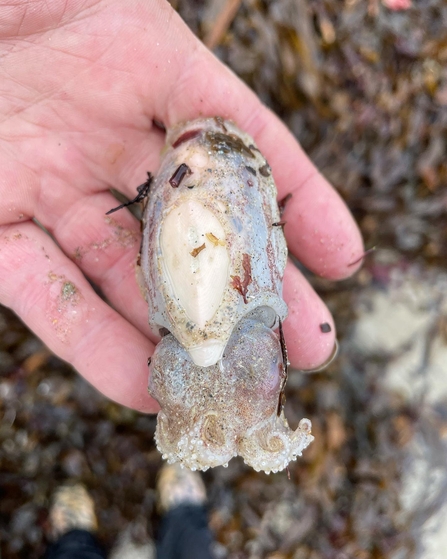The unusual find, now confirmed by marine biologists, was discovered by members of Mount’s Bay Marine Group on Marazion Beach after Storm Eunice. It was later reported to the Trust’s Marine Strandings Network – the licensed recorder for all marine strandings in Cornwall.

The visible cuttlebone of the rare pink cuttlefish on display, Image by Lucy Luck
Cases of pink cuttlefish bones have been logged in Cornwall Wildlife Trust’s marine strandings database of over 10,000 records before, but finding the animal intact is incredibly rare.
Figures show over 400 stranding events were recorded by the Trust last year, with an increasing number of calls typically received during the winter months.
Abby Crosby, marine conservation officer at Cornwall Wildlife Trust, said: “Our Marine Strandings Network records all dead organic material which washes up around our coastline, from huge basking sharks to non-native species like this rare pink cuttlefish. We’ve had some uncommon strandings in the last few weeks – everything from a seahorse to a common octopus – and it’s these records that help us understand the state of our seas.
“The Network has been running for nearly 30 years, providing an invaluable long-term dataset of marine strandings in Cornwall which in turn starts to flag changes in our marine environment.”
Abby continues: “Long-term monitoring by the Trust has helped to identify true changes in distribution of marine life, whether that be warmer water species such as the grey triggerfish becoming a more common sight or even a shift in common dolphin populations in recent years. It is essential that we keep these historic projects running and data coming in.”
The Trust is hosting its annual Marine Strandings Network Forum on Saturday 12th March, an event open to all members of the public to learn more about the project and the research taking place. The hybrid event can be attended online as well as in person at Truro College.
For more information and to sign up to the event, click on the button below.


